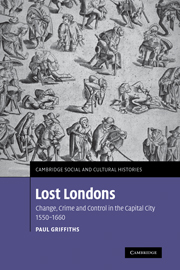1 - Troubled times
Published online by Cambridge University Press: 15 December 2009
Summary
‘Panic milieux’
Not one day goes by in any city of decent size without troubles – some slight, others more momentous – that continually shake its fabric and surface. Cities are never still, and they are never ‘at rest’. They grow, buzz, and change all the time, and keeping on top of trouble is always a round-the-clock concern. ‘Disorder’, one historian writes, ‘was the natural enemy of urban life’. Travellers are always trooping in and out of cities where they often have few or no roots. Some settle down somewhere and stay put long enough to become accepted and trusted by their new neighbours. Others are less lucky and struggle to stay above water. Many sink unless they can turn to makeshifts and crime to keep hunger at bay. This was how many thousands of people kept on top of things against the odds in sixteenth- and seventeenth-century London.
They arrived in droves, although migration did not mean the same for different classes, ages, genders, or races. Migrants came from all over the country and overseas. Many of them were down on their luck and hoped to scratch a living with a bit of work here and there. More fortunate were young men who came to London for a formal craft training to start working their way up the City ladder. London was the ‘head’ and ‘fountaine’ of the land, authors gloated, pulling in people from far and wide.
- Type
- Chapter
- Information
- Lost LondonsChange, Crime, and Control in the Capital City, 1550–1660, pp. 27 - 66Publisher: Cambridge University PressPrint publication year: 2008



